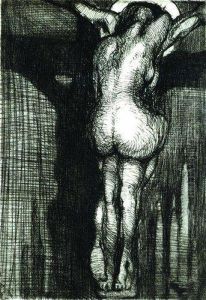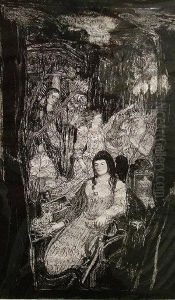Remy De Gourmont Paintings
Remy de Gourmont was a French symbolist poet, novelist, and influential critic. He was born on April 4, 1858, in Bazoches-au-Houlme, Normandy, France. De Gourmont came from a noble family and was initially destined for a career in law. However, his interests soon shifted towards literature and writing. After completing his education, he moved to Paris, where he would spend most of his life.
In Paris, de Gourmont was employed at the National Library, a position that allowed him access to a vast range of literary works and historical texts, which influenced his own writing and thinking. He became a prominent member of the Symbolist movement, which was characterized by its use of metaphor and a desire to evoke rather than to describe directly. De Gourmont's literary output was diverse, including poetry, novels, essays, and critical works.
His most significant contribution to literature was perhaps as a critic and thinker. De Gourmont championed the works of younger poets and writers, contributing to the development of the Symbolist movement and later influencing the Dada and Surrealist movements. He wrote for the influential literary journal 'Mercure de France' and developed a reputation for his erudite and often provocative critiques.
De Gourmont's personal life was marked by a long-lasting and intellectually fruitful relationship with the writer Berthe de Courrière, who inspired much of his work. In 1891, he suffered from a severe bout of syphilis, which affected his appearance and led to his relative isolation. Despite his illness, he continued to write prolifically.
Some of his notable works include 'Le Livre des masques' (The Book of Masks), a series of symbolist portraits, and 'Les Chevaux de Diomède' (The Horses of Diomedes), a collection of symbolic tales. His novel 'Sixtine' is considered a reflection of his own experiences and thought processes.
Remy de Gourmont passed away on September 27, 1915, in Paris, after several years of declining health. His works remained influential after his death, leaving a lasting legacy in French literature and criticism. De Gourmont is remembered not only for his own literary creations but also for his role in supporting and shaping the careers and works of other artists.





